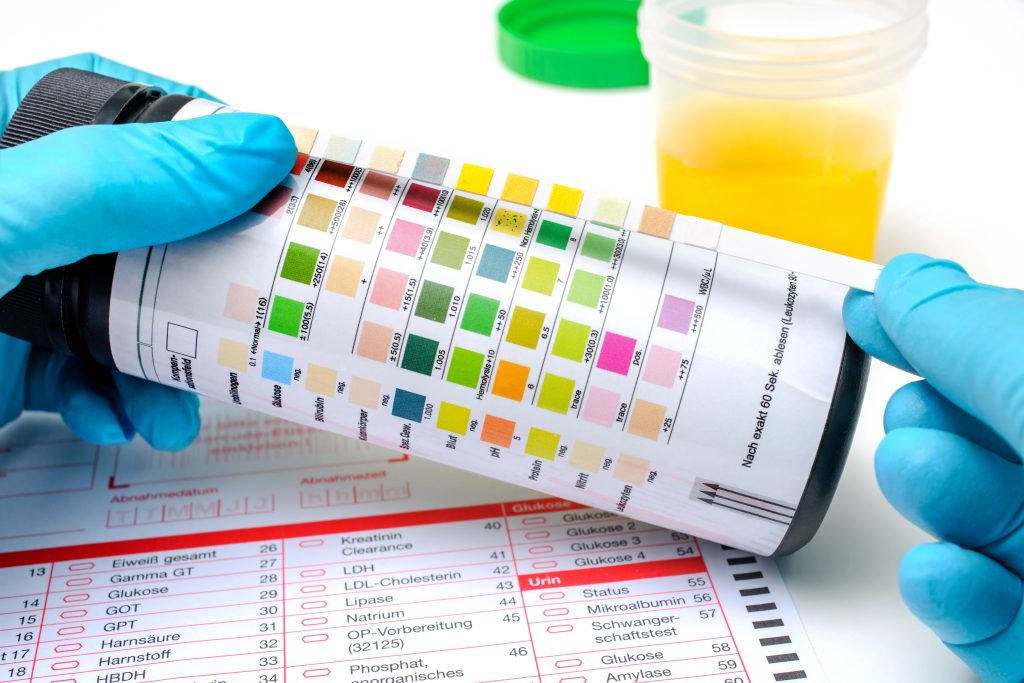Understanding how long delta 8 THC lingers in the body is a common concern, especially for those facing drug tests or curious about its effects. Delta 8 THC can remain detectable for a varying period, from days to over a month.
Delta 8 THC stays in your body for about the same amount of time as any other form of tetrahydrocannabinol (THC). A drug test can find evidence of THC within a matter of hours after consumption. Most drug tests will detect THC metabolites within hair or urine, depending on how often you consume delta 8 in any form.
Types of Drug Test Used
Any drug test you might use to test for THC metabolites can be purchased or done at a lab. Here are some of the most commonly used drug tests.
- Blood Tests
- Urine Tests
- Saliva Tests
- Hair Tests
While delta 8 THC is not federally illegal, some jobs and positions require a negative urine drug test on a regular basis.
What Is Delta 8 THC?

Delta 8 THC is a cannabinoid that is chemically similar to Delta 9 THC, the primary psychoactive component in cannabis. It produces mild intoxicating effects and is derived from hemp, making it legal in many states.
Delta 8 is just one of many cannabinoids made by the cannabis plant naturally. However, it does not occur in the plant in large quantities. Concentrated amounts of delta 8 are typically made from the hemp plant.
Chemical Structure
The chemical structure of delta 8 THC is similar to that of the more well-known delta 9 THC, which is commonly associated with marijuana. Both are forms of cannabinoids found in cannabis plants, but delta 8 has a unique arrangement of atoms that makes its effects less potent than those of delta 9.
This structural difference also contributes to the time it takes for delta 8 to be metabolized and eliminated from the body.
Understanding this molecular architecture helps explain why drug tests can pick up traces long after usage. The chemical bonds in delta 8 allow it to bind with receptors in the body’s endocannabinoid system. This influences how long its byproducts remain detectable in testing methods like urine or blood screenings.
With a half-life of about 30 minutes and taking roughly four hours for a standard dose to clear from your bloodstream, these considerations are crucial for anyone concerned about drug testing and detection times.
Psychoactive Effects
Delta 8 THC interacts with the body’s endocannabinoid system much like its more famous cousin, delta 9 THC. It binds to CB1 receptors in the brain, resulting in feelings of relaxation and euphoria.
Users often report a clear-headed high, allowing greater focus than traditional delta 9 experiences. This is why some people opt for delta 8 as their THC of choice – it provides a milder psychoactive effect while still delivering therapeutic benefits.
However, even though it’s considered less potent, it’s essential not to underestimate delta 8’s strength. The effects can vary greatly depending on individual body chemistry and tolerance levels.
Inhalation can rapidly introduce delta 8 into the bloodstream, creating effects that may last between one to two hours. Its metabolites linger long after those immediate effects have faded, potentially showing up in a drug test well beyond the period of perceived impairment.
Legal Status
The legal status of delta 8 THC varies widely and can be quite complex. In the United States, delta 8 is technically legal under federal law thanks to the 2018 Farm Bill, which legalized hemp-derived cannabinoids; however, this does not mean it’s free from all regulations or legal issues.
Each state has the right to determine its own laws regarding hemp products, and some have chosen to specifically ban delta 8 THC due to its psychoactive properties. Users must stay informed about their local laws as they could face legal penalties if caught with delta 8 in states where it is prohibited.
A positive drug test for delta 8 is not much different than a positive drug test for delta 9. A drug test will detect THC metabolites, but it will not make the distinction between the two types of THC.
Understanding these nuances is crucial for anyone considering using delta 8 or including it in their products. It’s also important for consumers because while a product might be purchased legally online or in one state, that same product could lead to trouble across state lines.
How Long Does Delta 8 Stay in Your System?

Delta 8 THC can be detected in drug tests using various methods such as urine and blood testing. The average detection period for delta 8 THC depends on several factors, such as metabolism, body weight, dosage, frequency of use, and method of consumption.
Why Would You Take A Drug Test For Delta 8?
THC stays in the body for a certain amount of time. Some people might take a drug test to see whether or not it has left. Some jobs prefer sobriety on the job, and will give either a urine test or a saliva test.
For other people who might work as federal employees, hair tests and blood tests are normal. Because THC is still federally illegal, all cannabis products that contain THC as the primary psychoactive compound will cause a positive drug test.
How The Drug Test Works
Delta 8 THC can be detected in various bodily fluids through drug testing methods. These methods include:
- Urine Test: This is the most common method for detecting delta 8 THC. It can detect the presence of THC metabolites, with detection times ranging from 3 days for single use to over 30 days for chronic heavy use.
- Blood Test: Although less common, blood tests can also detect delta-8 THC, providing a shorter detection window than urine tests.
- Hair Test: Traces of delta 8 can linger in hair cells for up to three months, making this method effective for identifying long-term use.
- Saliva Test: This method offers a shorter detection window and is typically used to detect recent use of delta 8 THC.
- Breath Test: While not widely used, breath tests may also be employed to detect recent ingestion or consumption of delta-8 THC.
Average Detection Period For Each Drug Test
Understanding the average detection period of delta 8 THC is critical for those who undergo drug testing. Different tests have varying windows of time during which they can detect the presence of cannabinoids like delta 8 in your system.
- Urine Test: 3 days (single use) to over 30 days (chronic heavy use)
- Blood Test: Up to 2 days
- Saliva Test: Up to 24 hours
- Hair Follicle Test: Up to 3 months
Traces in hair cells prove the most persistent, capable of revealing delta 8 usage for up to three months. Urine tests can show cannabinoid use from a few days to over a month, depending on usage patterns. THC is stored in fat cells, so it tends to linger over time depending on how much delta 8 you have consumed. For one edible or a couple of puffs, you will not have as much THC in your body as you would with chronic smoking or consumption.
Blood and saliva tests have shorter detection windows, usually limited to a few days and 24 hours. It is essential to note that these periods are estimates and can vary greatly among individuals, influenced by various physiological factors.
Factors Affecting Delta 8 THC Absorption
Several factors can influence the metabolism of delta 8 THC, including an individual’s metabolism rate, body weight, dosage and frequency of use, method of consumption, and other physiological factors. If you have smoked once, it will not show on a drug test six months later. But for other situations, the drug test results can be tricky.
Metabolism
Delta 8 THC metabolism varies depending on individual factors such as body weight, dosage, frequency of use, and method of consumption. Metabolism plays a key role in breaking down delta 8 THC in the liver and converting it into metabolites that can be detected through drug tests.
Factors like age, genetics, liver function, and overall health also influence how efficiently the body processes and eliminates delta 8 THC. The rate at which delta 8 is metabolized differs from person to person due to these variations. Additionally, chronic heavy use may prolong detection times in urine tests due to the cumulative buildup of THC metabolites in the system over time. Regular use means that more THC is stored in fat cells, which will then be eliminated via the body’s waste system. It can be caught in a drug test.
Body Weight
Factors influencing the metabolism of delta 8 THC include body weight. Delta 8 THC is lipophilic, meaning it can accumulate in fatty tissues and, therefore, may stay in the system longer for individuals with higher body fat percentages.
This can lead to prolonged detection times and variations in clearance rates among individuals based on their body mass index (BMI). The distribution of delta-8 THC throughout the body differs based on an individual’s adipose tissue percentage, which affects how long it remains detectable in drug tests.
The amount of adipose tissue directly impacts the rate at which delta 8 THC is metabolized, affecting how long it stays in an individual’s system. Consequently, individuals with higher body weights or higher adipose tissue levels tend to eliminate delta 8 THC from their systems more slowly than those with lower body weights or less adipose tissue.
Dosage and Frequency of Use
Chronic heavy use of delta 8 THC can lead to a prolonged presence in the body, with urine testing showing detection times of over 30 days. Likewise, even single use can be detected for up to three days with a saliva drug test.
The frequency and dosage of consumption directly impact how long delta 8 THC stays in your system. Higher doses and more frequent usage result in longer detection periods. Considering these facts, it’s crucial to consume delta 8 THC responsibly and be mindful of the dosage and frequency to avoid extended presence in the body.
Method of Consumption
When consuming delta 8 THC, the method of consumption plays a significant role in its duration in your system. Inhaling or smoking delta 8 leads to a rapid onset of effects, with the potential to last for 1-2 hours.
On the other hand, if consumed orally through edibles, it may take longer for the effects to kick in and stay in your system longer than inhalation. The bioavailability and metabolism of delta 8 THC vary depending on whether it is smoked, vaped, ingested as an edible, or used sublingually.
Additionally, factors such as dosage and frequency of use also come into play when considering how long delta 8 remains in your body. Higher doses and frequent use can lead to an accumulation of THC metabolites in your system over time.
Other Factors Affecting Delta 8 THC Absorption
When considering the duration of delta 8 THC in your system, it’s important to take into account various factors that can influence its metabolism and clearance. These factors include:
- Hydration level: Staying well-hydrated may help expedite the clearance of delta 8 THC from the body.
- Physical activity: Regular exercise can potentially speed up the metabolism and elimination of delta 8 THC.
- Liver function: Individuals with compromised liver function may have a prolonged clearance time for delta 8 THC.
- Genetics: Variations in genetic makeup can impact how quickly the body metabolizes and eliminates substances like delta 8 THC.
- Age: Metabolic processes can vary with age, potentially affecting the duration of delta 8 THC in the system.
- Overall health status: Underlying medical conditions might influence the rate at which delta 8 THC is processed and cleared from the body.
Using Delta 8 Responsibly

When it comes to delta 8, it’s important to understand the potential benefits and risks associated with its consumption. By being mindful of dosage and frequency and considering responsible consumption methods, individuals can make informed choices about incorporating delta 8 into their wellness routine.
Potential Benefits of Delta 8
Delta 8 THC may offer several potential benefits, including pain relief, anxiety reduction, and appetite stimulation. Studies have suggested that delta 8 THC has anti-inflammatory properties, making it a promising option for managing chronic pain without the potent psychoactive effects associated with delta 9 THC.
Additionally, individuals experiencing anxiety or stress may find that delta 8 THC produces a calming effect without the intensity often caused by traditional cannabis products. Furthermore, some users report increased appetite after consuming delta 8 THC, which can be particularly beneficial for individuals struggling with decreased appetite due to medical conditions or treatments.
Potential Risks of Delta 8
Chronic heavy use of delta 8 THC can lead to potential risks, including prolonged detection times in drug tests that may impact employment or legal matters. Overuse may also result in adverse effects on overall health and well-being, such as dependency and impairment of cognitive function.
Additionally, the long-term effects of frequent or chronic delta-8 THC consumption on mental and physical health are still being studied, raising concerns about potential unknown risks associated with extended exposure.
Furthermore, drug tests screen for THC, not for delta 8 or delta 9. A regular drug test will not differentiate between cannabis products. If you test positive for THC, even from delta 8, you will have a positive drug test.
Responsible Consumption of Delta 8
To minimize potential risks associated with delta 8 THC consumption, responsible usage is essential. Understanding the legal restrictions and regulations surrounding delta 8 products can help users consume these products responsibly.
Additionally, being aware of individual tolerance levels and using the appropriate dosage can significantly reduce adverse effects. Consulting with a healthcare professional before incorporating delta 8 THC into one’s routine is crucial to ensure safe and responsible use.
Open communication about the potential benefits and risks of delta 8 consumption within communities or support groups can also promote responsible usage. Moreover, promoting awareness about responsible consumption through education on safe storage, labeling practices for products containing delta 8 THC, and imparting knowledge on drug testing methods can contribute to a more informed user base.
Understanding How Long Delta 8 Will Stay In Your System
Delta 8 THC can remain in your system for a range of 2 to 30 days. Even after just one time use, traces may persist in hair cells for up to three months. Urine tests are capable of detecting delta-8 THC with detection times spanning from three days for single usage to over 30 days for heavy chronic use.
It is crucial to bear in mind that factors such as metabolism, body weight, dosage and frequency of use, method of consumption, and other variables can all impact the duration which delta 8 stays in your system.
FAQs
1. How long does delta 8 stay in the body?
Delta 8 THC can typically be detected in the body for around 2 to 4 days after use, but this can vary based on factors such as frequency of use and individual metabolism.
2. Can exercise help speed up the elimination of delta 8 from the body?
Engaging in physical activity and staying hydrated may help accelerate the natural clearance of delta 8 from the system.
3. Will drinking water flush delta 8 from my system faster?
While staying hydrated is important for overall health, excessive water consumption is unlikely to significantly expedite the removal of delta-8 THC from your system.
4. Can certain foods or drinks affect how long delta 8 stays in your system?
There’s limited evidence to suggest that specific foods or beverages have a substantial impact on how long delta-8 THC remains detectable in the body.
5. How accurate are at-home drug tests for detecting delta 8 in your system?
At-home drug tests may provide an indication of recent cannabis use, including potential presence of Delta 9 and other cannabinoids, but their accuracy can vary and should be interpreted with caution.






